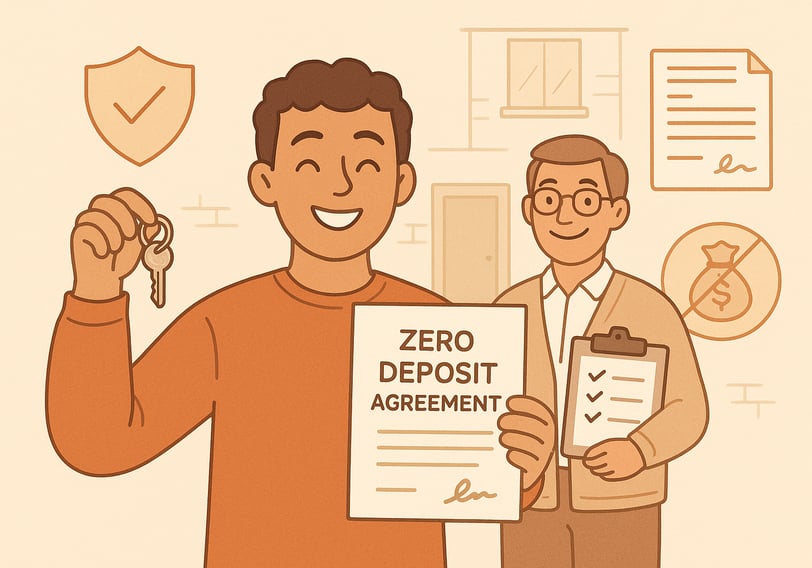Are Zero‑Deposit Rentals Safe? Risks, Legal FAQs, and Tenant‑Landlord Protections
Wondering if zero-deposit rentals are truly safe? This detailed guide explores the safety, risks, legal FAQs, and tenant-landlord protections involved in zero-deposit rental agreements in India. Learn how to avoid hidden charges, protect your rights, and rent smarter with verified platforms like CirclePe.
6/26/20254 min read


In the era of digital convenience and budget-conscious living, zero-deposit rentals are quickly becoming the preferred choice for tenants across India. For renters who are tired of locking away lakhs in traditional security deposits, these modern rental agreements seem like a dream come true. But the question that lingers for many is — Are zero-deposit rentals really safe?
Let’s unpack the concept, discuss potential risks, answer common legal questions, and understand the tenant-landlord protections in place so you can make an informed, confident rental decision.
What Are Zero-Deposit Rentals?
Zero-deposit rentals are rental agreements where the tenant is not required to pay the traditional 2–11 months' security deposit upfront. Instead, a small non-refundable fee or insurance premium is paid to a third-party provider or platform (like CirclePe) that guarantees protection for the landlord.
This model ensures:
Tenants avoid large upfront costs
Landlords still get risk coverage
Transactions are more transparent and system-driven
Why Are They Gaining Popularity?
With the average security deposit ranging from ₹50,000 to ₹2,00,000 in Indian metros, it’s no surprise that tenants—especially students, working professionals, and city-hoppers—are leaning towards deposit-free rentals.
Benefits of Zero-Deposit Rentals:
Better cash flow: No need to block a huge amount
Transparency: Agreements are often digital and clearly laid out
Speed: Move-in timelines are faster without deposit negotiations
Flexibility: Ideal for short-term or experimental stays
Are Zero-Deposit Rentals Safe for Tenants?
Yes, they can be — if done through verified platforms with clear contracts. The safety of zero-deposit rentals largely depends on three things:
1. Platform Legitimacy
Always go through authorized platforms like CirclePe or others who partner with trusted insurance firms. Avoid informal setups that just promise “no deposit” without proper documentation.
2. Transparent Terms in Agreement
Your rental agreement must clearly state:
Rent amount
Lock-in period (if any)
Move-out notice period
Responsibilities for repairs and damages
The nature of the zero-deposit clause
This ensures there are no hidden charges later.
3. Legal Documentation
Most zero-deposit platforms operate via registered rental agreements that are legally enforceable. As long as everything is documented, your rights as a tenant are protected.
Are Landlords Protected in Zero-Deposit Rentals?
Absolutely. In traditional setups, landlords rely on deposits to cover unpaid rent or damages. With zero-deposit models:
They’re covered via rental risk insurance
The platform mediates disputes and ensures recovery
They still get tenant verification and KYC documentation
It’s a win-win model, provided both parties understand and agree on the clauses.
Read: How to Complete Digital KYC and Sign E-Agreements for Online Home Rentals
Key Risks to Watch Out For
Like any evolving model, zero-deposit rentals are not without potential pitfalls. Here's what you should watch out for:
1. Lack of Awareness
Not all landlords understand the model. Some may still expect informal deposits or resist the concept unless clearly explained.
2. Hidden Charges
Some platforms might add "admin fees," "processing charges," or “move-out penalties.” Always read the fine print.
3. Non-Refundable Fee Confusion
Unlike traditional deposits, the zero-deposit fee is non-refundable — it's often a service charge or premium. Make sure you’re okay with this trade-off.
4. No Exit Clarity
If the move-out process isn't clearly defined, disputes may arise about unpaid bills or property damage. Stick to platforms with a proper move-out SOP.
Legal FAQs on Zero-Deposit Rentals
Are zero-deposit rental agreements legally valid in India?
Yes, if they are executed on a valid stamp paper and registered where required. Always insist on a digital or hard copy signed by both parties.
Who handles damage costs if there’s no deposit?
Usually, the tenant agrees (in the rental agreement) to cover any damage beyond regular wear and tear. Some platforms also have insurance to compensate the landlord and then recover from the tenant if needed.
Can a landlord evict me easily without a deposit in place?
No. The Rent Control Act and tenancy laws apply regardless of deposit type. You cannot be evicted without due legal process.
What happens if I default on rent?
The landlord is protected via the platform's risk coverage or policy. Tenants, however, may face penalties, blacklisting, or legal notices, just like in traditional rentals.
Is KYC mandatory in zero-deposit rentals?
Yes, proper KYC verification and background checks are done to protect both parties.
How Platforms Like CirclePe Ensure Protection
CirclePe, for instance, bridges trust gaps using tech, insurance, and compliance. Here's how:
Tenant Protection:
Pre-approved, zero-deposit flats with proper legal agreements
No broker involvement
Transparent rent, terms, and move-out rules
Optional customer support for grievances
Landlord Protection:
Tenant KYC + income verification
Damage insurance or service fee coverage
Guaranteed rent recovery assurance
Legal support for contract enforcement
Tips for Tenants Considering a Zero-Deposit Flat
✔ Ask for a copy of the agreement before moving in
✔ Get everything in writing — verbal promises won’t protect you
✔ Clarify all fees and responsibilities
✔ Understand the move-out process
✔ Prefer verified listings on rental platforms rather than informal brokers
The Verdict: Safe, Smart — But Stay Aware
Zero-deposit rentals are a major step forward in making renting more accessible and tenant-friendly in India. But like any financial commitment, you must read the fine print, verify the platform, and know your rights.
If you’re a tenant tired of outdated renting practices or a landlord exploring smarter leasing models, zero-deposit is safe — if done right.
Final Thoughts: Should You Go for It?
If you're renting in fast-moving cities like Bangalore, Pune, Hyderabad, or Gurgaon — where deposits can be as high as ₹1.5 lakh — then yes, zero-deposit rentals make solid sense. The upfront cost is lower, paperwork is digital, and protections are built in.
But remember: not every “no deposit” flat is the same. Trust platforms that explain things clearly, avoid vague verbal deals, and always choose transparency over urgency.
Looking for Verified Zero-Deposit Homes?
Join thousands of smart renters who’ve already made the switch with CirclePe. We list 100% verified, zero-deposit flats with tenant support, landlord protections, and clear legal agreements.
NCR Housing
Your guide to NCR housing insights and tips.
Subscribe us
© 2025. All rights reserved.
